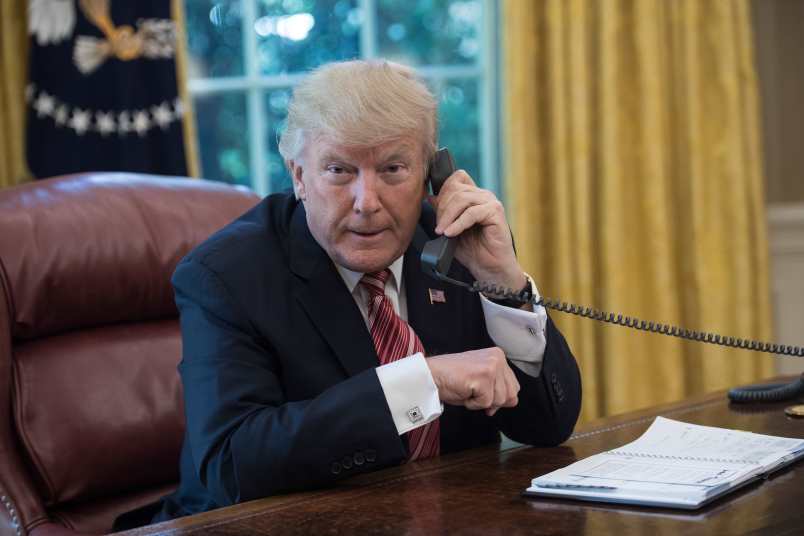A key call between President Trump and a U.S. ambassador involved in the Ukraine pressure campaign was revealed Monday evening, just before the diplomat was blocked from speaking to Congress about the endeavor
Gordon Sondland, the U.S. ambassador to the European Union, called President Trump last month after a career US official in Kyiv rang the alarm about Trump allegedly leveraging military aid for political favors from Ukraine.
Sondland’s call to the President occurred within a roughly five-hour gap between a text from Bill Taylor, the charge d’affaires at the U.S. embassy, and Sondland’s text response, the New York Times and Wall Street Journal reported.
Taylor had said that it “crazy” the aid was being withheld for “help with a political campaign.” When Sondland responded, he denied the allegation, claiming: “President has been crystal clear no quid pro quo’s of any kind.”
Sondland then instructed Taylor to stop putting his concerns in writing and to call Secretary of State Pompeo or a Pompeo aide if he wanted to discuss the matter further.
The call was the latest piece of evidence showing the unusual role Sondland was playing as intermediary between the President and those on the ground in Ukraine hustling to see that Trump’s demands for politically-helpful investigations be met.
The call also came weeks after the White House became aware that a whistleblower had raised concerns to the CIA of improper Trump behavior towards Ukraine, and while officials in the administration were scrambling to contain the fallout of those allegations.
What exactly Trump said on his call to Sondland and whether the President was aware of the effort to contain the damage already done by his Ukraine-related conduct, are unanswered questions.
Democrats warned that White House’s refusal to allow Sondland to sit for a voluntary interview Tuesday, which Sondland had agreed to, would support the obstruction case against the President as the House advances its impeachment inquiry
Beyond Sondland’s apparent role facilitating discussions between U.S. diplomats, Ukraine officials and Trump personal attorney Rudy Giuliani, Sondland was in direct and frequent contact with the President.
It was the President himself who had instructed Sondland to get heavily involved in U.S.-Ukraine relations; former US diplomats have noted how atypical Sondland’s Ukraine dealings were given, his role as the European Union envoy.
Sondland also spoke to President Trump right before Trump’s July 25 call with Ukraine President Volodymyr Zelensky, during which Trump pushed Zelensky to investigate Joe Biden and a conspiracy theory about the 2016 election meddling investigation. Sondland met with Zelensky in Ukraine the day after the call.
After the Trump administration blocked Sondland’s House interview Tuesday, House Democrats quickly announced plans to subpoena the official, a GOP donor who was appointed ambassador in 2018.
“
Even as Sondland had appeared to tamp down Taylor’s frustrations about a Trump-ordered quid pro quo, he himself expressed his own concerns about a week earlier to Sen. Ron Johnson (R-WI).
According to Johnson’s account to the Wall Street Journal, Sondland told Johnson that Trump would release the assistance if he was “confident” the country was going to “get to the bottom of what happened in 2016. Johnson, alarmed by Sondland’s remark, called President Trump the next day, on Aug. 31, and Trump vigorously denied the allegation, the senator told the Journal.
However a “person familiar” with Sondland’s memory of the call told the Journal, that it was a Zelensky visit to the White House that Sondland believed was being withheld until Ukraine met Trump’s demands — a dynamic that was also well documented in the Sondland texts that have been released publicly.
Exactly what Sondland thought about what was being requested of Ukraine and what he knew of Trump’s involvement in those requests are key questions for House investigators.
House Intelligence Committee Chairman Adam Schiff (D-CA) referenced those conversations specifically on Tuesday morning, when condemning the move by the administration to block Sondland’s appearance before his committee. He also revealed that there were “deeply relevant” messages Sondland sent from a personal device that the State Department was refusing to turn over to the House.
Throughout August, Sondland and U.S. special envoy to Ukraine Kurt Volker pushed Zelensky’s aides to provide a draft statement announcing the opening of 2016 and Biden probes. When the draft that Ukraine proposed only addressed investigating corruption in a general sense, the U.S. diplomats — at the request of Trump lawyer Rudy Giuliani — sought specific mentions of 2016 and Burisma, the natural gas company where Hunter Biden sat on the board.
According to their texts, the White House would not announce the date of the Zelensky visit until Ukraine had a satisfactory statement on the investigation to unveil at the same time.
Ukraine ultimately rebuffed the requests for those particular references and then there was talk among the diplomats of Zelensky doing a media interview where he’d make similar commitments to Trump-desired investigations, according to the Journal.
Republicans on the relevant House committees have claimed that Volker, in his House interview last week, denied being aware of that military aid was being withheld in exchange for the requested investigations. According to Republicans’ account of Volker’s testimony, Volker said that Taylor’s claims about a military aid quid pro quo were prompted by a Politico report on the assistance being frozen.
It has since been reported that Trump himself ordered the freeze and that government agencies involved were kept in the dark on why it was being withheld.
Trump has since offered counter explanations for why he didn’t want the assistance released, but according to Sen. Ron Portman (R-OH), the leader of the Ukraine caucus, Trump did not tell the lawmaker about those reasons until the day the aid was unfrozen.






